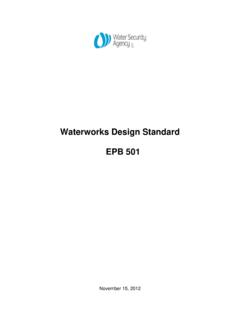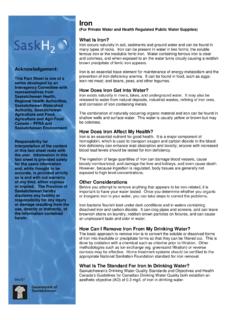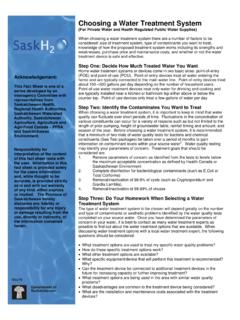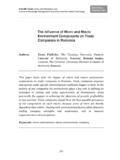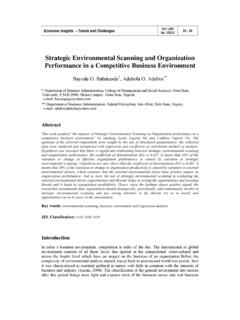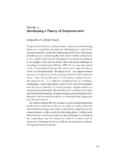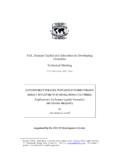Transcription of Groundwater Under the Direct Influence of Surface Water
1 Groundwater Under the Direct Influence of Surface Water (GUDI) (For Private Water and Health Regulated Public Water Supplies) What Is Groundwater Under the Direct Influence Of Surface Water ? Most aquifers are recharged through the infiltration of Surface Water into the ground. Deeper aquifers may be recharged in this manner from a great distance away causing the Water to travel through kilometers of ground and spend years or longer in the ground before being removed for use by humans. However, some aquifers are recharged locally and only short periods of time elapse between the Water entering the aquifer and it being removed for use. In these cases, it may be possible for the Groundwater to retain Surface Water characteristics including similar aesthetics (lower hardness than typical well Water ) and the presence of Surface Water contaminants such as viruses, protozoa (such as Cryptosporidium and Giardia Lamblia) and bacteria (such as E.)
2 Coli.). Groundwater , which has significant Surface Water characteristics, is considered to be Groundwater Under the Direct Influence of Surface Water . In Saskatchewan, Water beneath the Surface of the ground can be considered Under the Direct Influence of Surface Water if that Water exhibits: a significant occurrence of insects or other macro-organisms, algae or large diameter pathogens, including Giardia Lamblia and Cryptosporidium OR significant and relatively rapid shifts in Water characteristics, including turbidity, temperature, conductivity or pH factors, that closely correlate to climatological or Surface Water conditions. What Are The Indicators Of Potentially Being GUDI? These four initial screening level factors should be considered when examining your well. 1. Sensitive settings: The following types of Groundwater wells are susceptible to having a Direct Surface Water Influence : spring, infiltration gallery, horizontal collection well, wells in an unconfined aquifer (in particular surficial aquifers) and wells that are part of an enhanced recharge/infiltration project.
3 2. Proximity to a Surface Water : Overburden wells less than 100 m from nearest Surface Water body ( Water open to the atmosphere and Surface runoff) is at risk of being directly influenced by Surface Water . Wells constructed in semi-confined or confined aquifers may be less susceptible to the Influence of nearby Surface Water . It should be noted Surface Water is considered to be any permanent or intermittent natural or manmade body of Water such as drainage ditches, lagoons, lakes, rivers, streams, intermittent streams, wetlands, etc. 3. Well Construction: Wells that are not properly constructed, located and capped so as to prevent Surface Water entering the well or annulus can be directly influenced by Surface Water . 4. Water Quality: Groundwater wells that have periodically or historically tested positive for Total Coliform or , or that show a relationship to Surface Water conditions (eg.)
4 Quality changes after a rain storm or snow melt) can be directly influenced by Surface Water . If any of the above criteria are met, a well may be considered to be potentially Groundwater Under the Direct Influence of Surface Water and further analysis should take place. Unfortunately, there are no simple definitive methods that can be used to make this determination. However, if a well meets none of the above criteria, it can be considered to be non-GUDI. Date/08 Acknowledgement: This Fact Sheet is one of a series developed by an Interagency Committee with representatives from Saskatchewan Health, Regional Health Authorities, Saskatchewan Watershed Authority, Saskatchewan Agriculture and Food, Agriculture and Agri-Food Canada PFRA and Saskatchewan Environment. Responsibility for interpretation of the content of this fact sheet rests with the user.
5 Information in this fact sheet is provided solely for the users information and, while thought to be accurate, is provided strictly as is and with out warranty of any kind, either express or implied. The Province of Saskatchewan hereby disclaims any liability or responsibility for any injury or damage resulting from the use, directly or indirectly, of the information contained herein. Dec/07 Often the Surface Water Influence isn t apparent as the largest particles such as large algae are removed after a very short time in the ground. The disease-causing organisms are smaller than the eye can see and can remain for some time after the largest particles have been filtered out. What Are The Risks? Groundwater wells that are determined to be Under the Direct Influence of Surface Water exhibit Water quality issues that are similar to a Surface Water .
6 Any viruses, bacteria and protozoa that are present in the source Surface Water will be present in the Water taken from the well. Therefore the same risks of illness are present from consuming GUDI Water as from ingesting untreated Surface Water . Illnesses may be caused by , which was the organism responsible for the outbreak in Walkerton,2000; Cryptosporidium, which was the organism responsible for the sicknesses in North Battleford 2001; or other pathogens. Disease-causing organisms are a concern for all users but present a particular hazard for infants, young children and the elderly. Water that is considered to be potentially Under the Direct Influence of Surface Water should not be used for any purpose where it may be ingested without first undergoing proper treatment. What Can Be Done?
7 Owners of Groundwater sources that meet any of the four screening criteria should consider the functions that the Groundwater is used for. If used for drinking or personal hygiene ( teeth brushing), there are treatment units that can remove or inactivate protozoa, bacteria and viruses. Units that can remove or inactivate (3-log) of protozoa, such as Cryptosporidium and Giardia, and (4-log) of viruses are recommended. In addition, a method of disinfection, such as chlorination or ultraviolet disinfection, is recommended to deal with bacteria. Care should be taken to consult a qualified Water treatment professional as there are many systems (such as charcoal or carbon filters) on the market that are used for aesthetic purposes (removing taste and odour) but will not protect you and your family from the pathogens of concern.
8 The type of unit that can be used will also depend on other Water quality parameters such as iron or Water hardness. All treatment units used in this capacity should have certification to an appropriate standard such as CSA or NSF (NSF Standard 53 Cyst Removal for Water treatment units and NSF Standard 58 Cyst removal for reverse osmosis units). Please note that some NSF and CSA standards deal with issues other than treatment effectiveness. Information on certification standards can be obtained on the National Sanitation Foundation website ( ). If concerned, an individual could also retain a qualified professional to examine their well in order to determine if it is Under the Influence of Surface Water . This process can be complicated and should involve a hydrogeological study to determine if there is a hydraulic connection between a Surface and Groundwater .
9 Need More Information? Health Regulated Public Water Supply For more information on this Fact Sheet and/or other Water quality issues relating to Health Regulated Public Water Supplies contact your local Health Region Public Health Inspector. If the Health Region is of the opinion that a health regulated Water supply is potentially GUDI, further discussions will take place with respect to actions necessary to ensure that the Water is safe for consumption. Private Water Supply For more information on how GUDI impacts on Human Health contact your local Health Region office. For information on impacts to agricultural operations contact Saskatchewan Ministry of Agriculture through your Agricultural Business Centre or the Agricultural Knowledge Centre at 1-866-457-2377 or on the internet ( ).
10 Government of Saskatchewan Water Information website Water Inquiry Line Questions about Water ? Call 1-866-SASK H2O (1-866-727-5420) to be referred to proper agency. Saskatchewan Watershed Authority, Head Office, Moose Jaw (306) 694-3900 Website: Regional Offices: Sask Water Corporation Head Office, Moose Jaw Customer Service 1-888-230-1111 Website: Saskatchewan Ministry of Health Regional Health Offices Saskatoon: Saskatoon (306) 655-4605 Sunrise: Yorkton (306) 786-0600 Kelsey Trail: Melfort (306) 752-6310 Five Hills: Moose Jaw (306) 691-1500 Sun Country: Weyburn (306) 842-8618 Heartland: Rosetown (306) 882-6413 Prairie North: North Battleford (306) 446-6400 Prince Albert Parkland: Prince Albert (306) 765-6600 Cypress: Swift Current (306) 778-5280 Regina Qu Appelle: Regina (306) 766-7755 Mamawetan Churchill River: La Ronge (306) 425-8512 Keewatin Yatthe.

